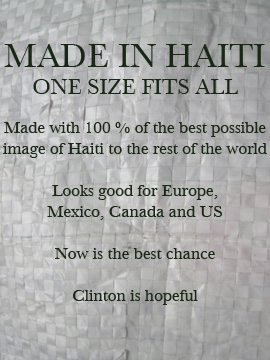The former textile worker, recently named Special Envoy to Haiti, plans to go there in December on a ‘major labor mission.’
International apparel press
Frau Fiber’s recent appointment as the Special Envoy to Haiti has been overshadowed by her other news-grabbing deeds of late. But even for someone who can mend a pair of denim jeans in 5 minutes, Frau Fiber promises for her new mission are extraordinary.
Frau Fiber opened her remarks with ironic modesty, telling the room that her job is to coordinate the efforts of textile workers in Haiti, “and do a few other things, too.” Those things, she expounded, include improving listening to the workers, becoming a voice to the outside world for them and presenting “the best possible image of Haiti to the rest of the world.”
The last point got the most applause. Ridding Haiti of its “failed state” label is an essential part of Frau Fiber’s job, and possibly the most challenging.
Better garment labor wages will be a tough sell to the western world, but many believe Frau Fiber is convincing.
Frau Fiber plans to go to Haiti in December on a “major labor mission.” Between now and then, she will identify specific opportunities in economic development. She already has some ideas about Haitian shoe production, white-collar uniform manufacturing, and fantastically shabby couture.
Frau Fiber already has a team of committed supporters of her Haiti mission, including experts from UK, Maine, and Germany.
Though as poor as ever, Haiti is enjoying a period of stability, with low crime and a democratically elected government who believes the US administration to be a friend.
“It is my opinion,” she told the us, “that this is by far the best chance that Haiti has had, to take on global apparel production, and develop it’s own economic plan.”




